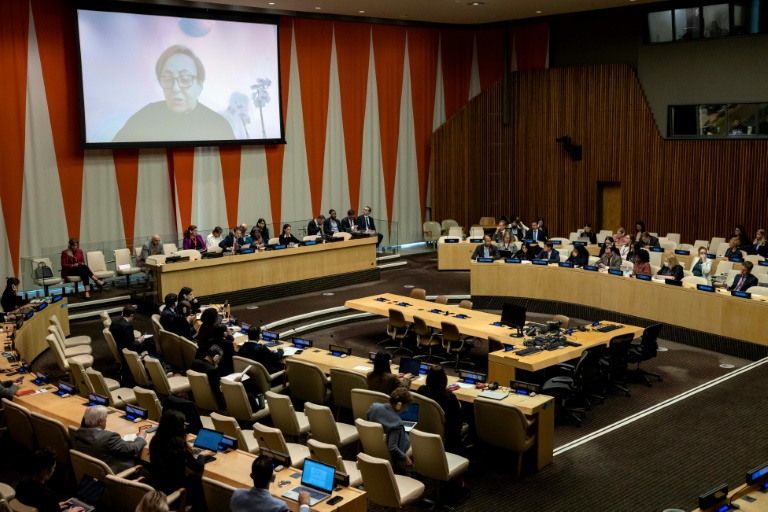US moves to remove ‘unfit’ Iran from UN women’s commission

Dr Shirin Ebadi, an Iranian Human Rights Defender and Nobel Peace Prize Winner, speaks virtually during an arria-formula meeting regarding the protests in Iran, at the United Nations headquarters in New York City on November 2, 2022
Washington – Vice President Kamala Harris vowed Wednesday that the United States would work to remove Iran from a UN body on women’s rights as she saluted the “bravery” of women-led protests against the clerical state.
Harris said that the United States would work with other nations to oust Iran from the UN Commission on the Status of Women, whose members are elected to four-year terms.
“Iran has demonstrated through its denial of women’s rights and brutal crackdown on its own people that it is unfit to serve on this Commission,” Harris said in a statement.
“Iran’s very presence discredits the integrity of its membership and the work to advance its mandate,” she said.
Iran is witnessing some of the most significant protests since the 1979 Islamic Revolution in the wake of the September 16 death of Mahsa Amini, a 22-year-old who had been detained by the notorious “morality police” that enforces strict codes on women’s dress.
“To all of those protesting I say again, we see you and we hear you. I am inspired by your bravery, as are people around the world,” Harris said.
The United States and European allies have imposed a series of sanctions on Iran over the protests and worked to help restore internet access disrupted by authorities.
Nations on the women’s commission are elected by the UN Economic and Social Council, whose members in turn are voted on by the General Assembly.
Iran, ruled by Shiite Muslim clerics, was elected to a term that ends in 2026. The United States is serving through next year.
Other nations on the body include Afghanistan although the country is not represented at the United Nations by the Taliban, who stormed back to power last year and have banned women from government jobs and forbidden secondary education for girls.
– Iran denounces ‘violation’ –
Harris announced the diplomatic effort ahead of an informal UN Security Council session led by the United States and Albania.
Iran’s envoy to the United Nations, Amir Saied Iravani, called the meeting a “flagrant violation” into the country’s domestic affairs and denounced US sanctions against his country.
“It has become a standard practice for the US to abuse such valued concepts as human rights and manipulate the UN platforms and resources to advance its ill-based political agenda,”
Iravani said that Iranians had a right to expression but that protests “should not lead to violence and destruction, chaos or instability.”
But the session heard from Iranian activists who urged a firm line in support of protesters.
Shirin Ebadi, a Nobel Peace Prize-winning Iranian rights lawyer now living in exile, pointed to the jailing of reporters who exposed Amini’s case, saying the state considered “journalism a publishable crime.”
“The people of Iran ask Western governments, especially the United States, to refrain from entering into any type of agreements that will help the survival of the regime,” she said, amid a deadlock in diplomacy to restore a 2015 nuclear accord.
“The Islamic Republic does not spend the funds for the welfare of the people but, on the contrary, buys more weapons,” she said.
The actress and activist Nazanin Boniadi rejected the “myth” that a compulsory headscarf was part of Iranian culture and should be respected.
“You don’t need to subjugate people into observing cultural norms,” she said.
“Where schoolgirls are defying a lifetime of indoctrination by rising up in classrooms and people are taking to the streets in the tens of thousands to protest something despite the risk of death at the hands of the authorities, you can safely assume that’s not part of their culture.”
